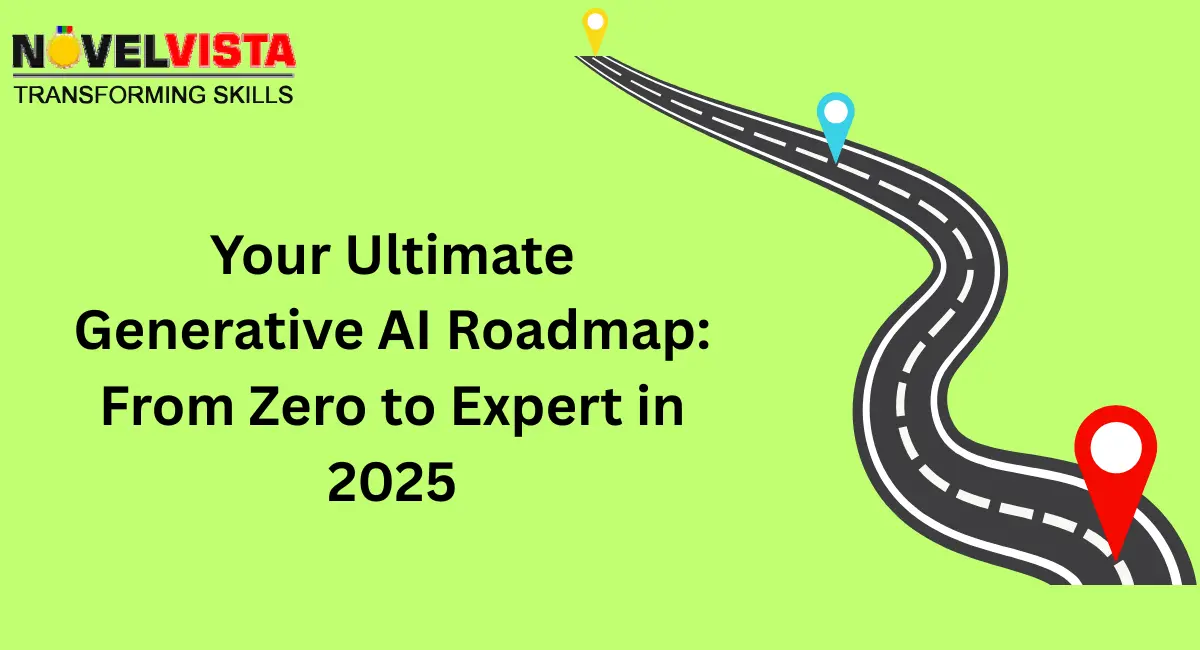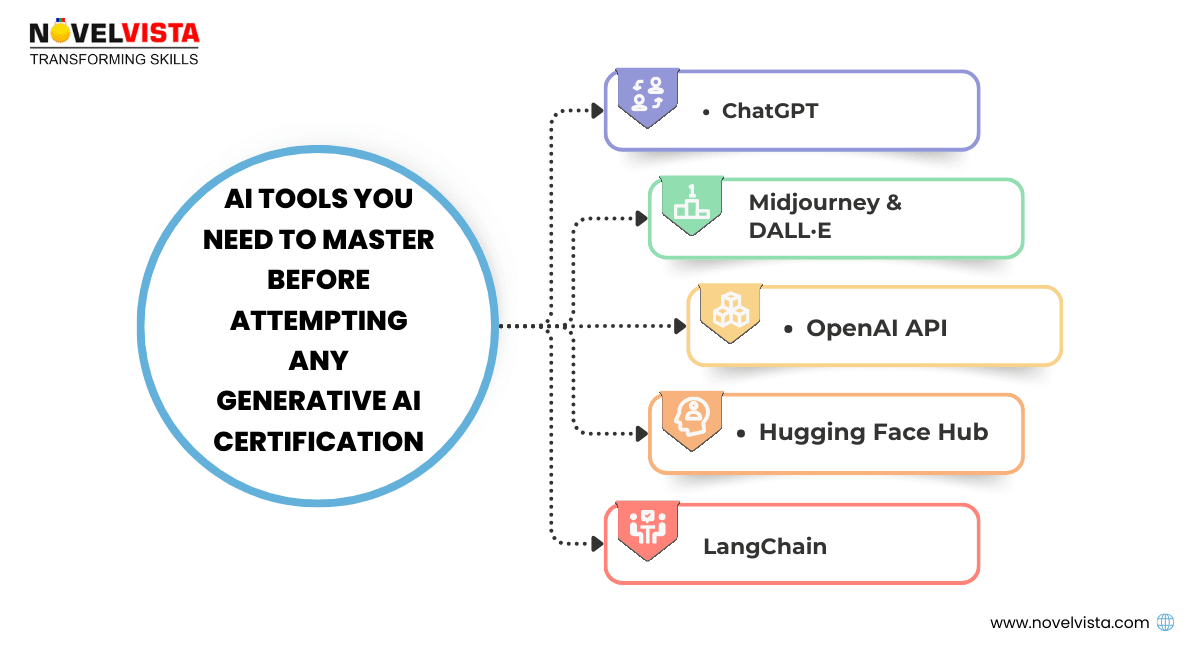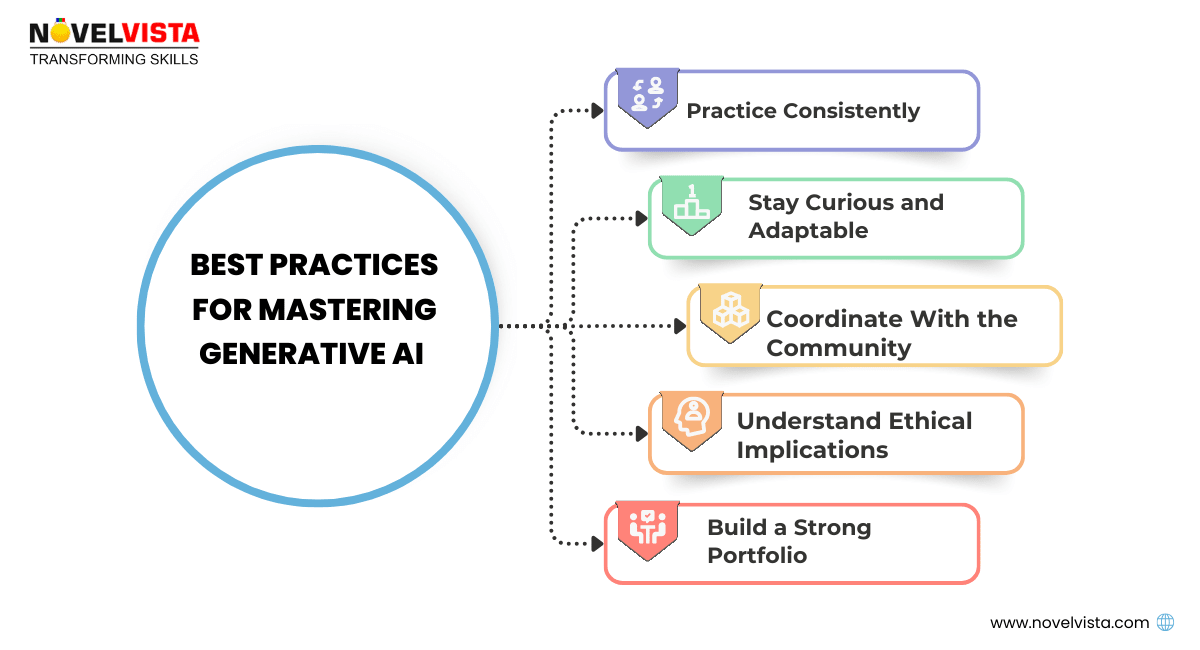
Generative AI is one of the most exciting and transformative technologies changing the future. From text to art, code, and even videos, this powerful technology is reshaping industries and opening up new opportunities for professionals across various domains. But how can you handle this large amount of information available? How do you find a clear path from being a beginner to becoming an expert?
That's where a perfect Generative AI roadmap comes in. In 2025, the demand for generative AI professionals is increased exponentially, and understanding the right steps to take can boost your career. Whether you’re interested in exploring Generative AI for beginners or targeting to dive deep into its advanced terms, this guide will provide you with a well-planned roadmap that provides to all learning levels.
In this comprehensive roadmap, you will gain insights into the best Generative AI certifications, the prerequisites you need, and hands-on experiences to help you become a generative AI expert.
You'll also familiarize with the Generative AI certification cost and how to know which certifications are deserving for your time and investment. Let's start this journey from scratch to mastery in the world of Generative AI!
Generative AI represents AI technologies that can generate new content depending on data inputs. From drafting human-like text to generating images, music, and even videos, generative AI is completely reshaping the way we engage with machines. It’s not just about automation—it’s about creation.
Popular Use Cases of Generative AI:
Real-World Impact on Industries:
Generative AI is no longer a futuristic concept—it's here, and it's transforming industries:
Evolving Trends:
As we move into 2025, here are some exciting trends to watch out for:
Not everyone follow the same paths and has the same goals. Whether you are a complete Generative AI beginner or someone trying to create applications with lext level technology, there's a customized learning path for you. Let’s break it down.
1. The Curious User:
2. The Power User:
3. The Developer:
4. The Researcher:
In the fast-growing world of Generative AI, gaining the right certification is a great way to show your skills. Here are some of the best Generative AI certifications to think about:
Before having a deep look into the Generative AI roadmap, it's important to have a basic knowledge of specific areas:
Build Strong AI & ML Foundations (Weeks 1–4)
Before diving into generative models, it’s important to build a solid foundation in AI and Machine Learning (ML). This phase will introduce you to key machine learning concepts, data processing, and model analysis.
Key Areas to Focus On:
Deep Learning & Neural Networks (Weeks 5–6)
Now that you have a strong understanding of machine learning basics, it’s time to explore Deep Learning (DL). This phase will aim to focus on neural networks and their different frameworks, which are important for generative AI.
Key Areas to Focus On:
Enter the Generative Zone (Weeks 7–10)
Now, you’ve formed a base for machine learning and deep learning. It’s time to dive into Generative AI, where we’ll cover the core concepts that power models like GPT-3/4 and other generative tools.
Important Concepts to Understand:
Advanced Topics for Power Users and Developers (Weeks 11–12)
As you step ahead into your Generative AI roadmap, you'll get to know more advanced topics that are essential for power users and developers. This phase focuses on refining models, using retrieval-augmented generation (RAG), and building well-developed AI systems.
Key Areas to Focus On:
To be successful in generative AI, you must have mastery over certain tools. Here’s a complete list of the most important ones to get practical experience with.
Tool Suggestion by Persona:
Developers: Explore deeply into TensorFlow, PyTorch, and well-developed APIs for building personalized generative models.

Now that you have a step-by-step roadmap to follow, it’s time to get more information about the career opportunities available in the Generative AI field. Here are some exciting career paths and the certifications you should think about to get ahead:
1. Prompt Engineer: Specializes in writing prompts to guide generative models.
2. LLM Developer: Aim to focus on constructing and refining large language systems.
3. AI Research Scientist: Puts efforts into advanced AI research to improve current models or create new ones.
4. Machine Learning Engineer: Focuses on constructing and delivering machine learning systems for AI applications.
Resume Tips:
As you move forward with your Generative AI roadmap, you might be considering professional certification to further verify your skills. Here’s what you need to know about the certification cost:
While costs might change, investing in these certifications can be a strategic step towards advancing your career in Generative AI. The return on investment is usually notable, as AI and machine learning roles are two of the highest-paid in the tech industry.

To make your journey seamless and easier in Generative AI, the following are some of the best practices to follow:
1. Practice Consistently
Like any skill, mastery in Generative AI demands regular practice. Try to work on small projects, participate in AI challenges, and experiment with different types of generative models. Platforms like Kaggle and GitHub are excellent for finding real-world problems to solve.
2. Stay Curious and Adaptable
Generative AI is a rapidly growing field. Stay on track with the latest improvements in system framework, training techniques, and new tools. Subscribe to AI newsletters, follow thought leaders on social media, and attend webinars to stay ahead in the game.
3. Coordinate with the Community
Generative AI isn’t something you have to learn all by yourself. Collaborating with knowledge seekers like you, researchers, and developers can provide valuable and notable insights. Contribute to open-source AI projects, attend AI meetups, and engage in online forums.
4. Understand Ethical Implications
Generative AI comes with a variety of ethical challenges. Be aware of the potential biases in AI models, the need for clarity, and the impact of AI on privacy and security. As you work with AI models, think about how you can validate fairness and reduce harm in your projects.
5. Build a Strong Portfolio
Building a portfolio of generative AI projects is important. It lends a hand to showcase your skills to potential employers and clients. Your portfolio could include projects such as:
6. Use Pre-Trained Models
Rather than starting from scratch, use pre-trained models such as GPT-3, BERT, or StyleGAN to refine them for your own applications. This minimizes the need for massive processing power and allows you to build AI models with increased speed.
Generative AI is still in its early stages, but its capability is already vast. Here’s what the future may hold:
Creativity Boost for Artists: With tools like MidJourney and DALL·E, artists will get the ability to quickly draft creative ideas, combining the human touch with the high-performance computing strength of AI. This opens doors for exciting opportunities in music, visual arts, film, and more.
Generative AI is a remarkably exciting and rapidly growing field that provides opportunities beyond any boundaries. By following this roadmap, you’re already well on your way to mastering one of the most transformative technologies of our time.
Here’s What You Can Do Next:
The field of Generative AI possesses opportunities beyond expectations. Whether you are planning to involve in AI research, develop new tools, or construct applications powered by AI, the future is bright and it's time to take the advantage of the opportunity.
Take Action Now: Sign Up for NovelVista’s Generative AI Certification Course!
Want to take your AI skills to the next level? NovelVista’s Generative AI Professional Certification is the best way to get certified and get practical experience with well-developed generative AI technologies.
Join Our Expert-Led Generative AI Bootcamp Today!
I am an Accredited ITIL, ITIL 4, ITIL 4 DITS, ITIL® 4 Strategic Leader, Certified SAFe Practice Consultant , SIAM Professional, PRINCE2 AGILE, Six Sigma Black Belt Trainer with more than 20 years of Industry experience. Working as SIAM consultant managing end-to-end accountability for the performance and delivery of IT services to the users and coordinating delivery, integration, and interoperability across multiple services and suppliers. Trained more than 10000+ participants under various ITSM, Agile & Project Management frameworks like ITIL, SAFe, SIAM, VeriSM, and PRINCE2, Scrum, DevOps, Cloud, etc.
* Your personal details are for internal use only and will remain confidential.